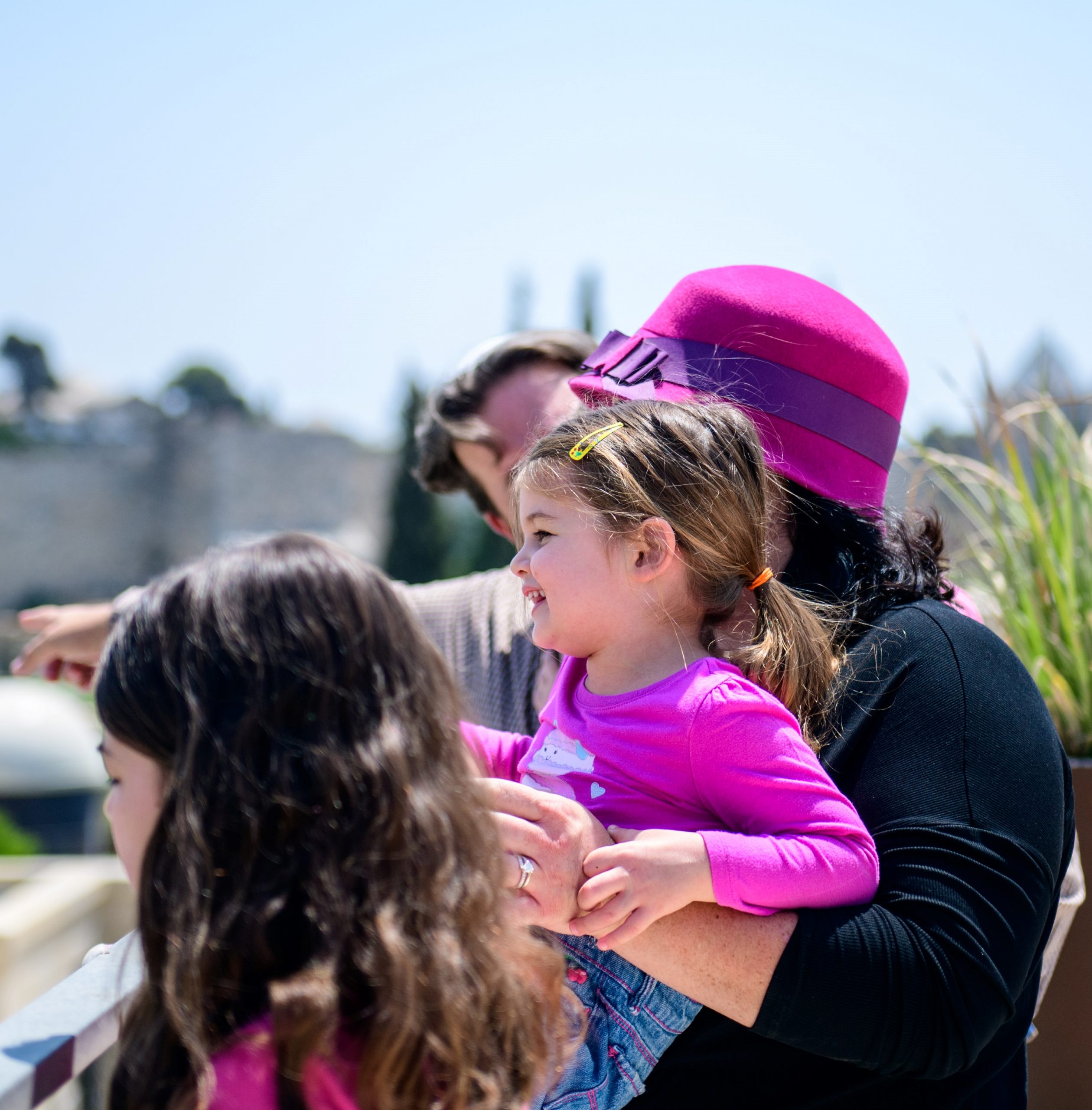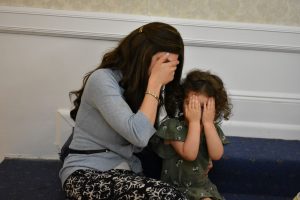
Teaching by Example or Watch Your Mouth!
Written by Ruti Eastman
You know they’re watching you. Whatever you do, even when you think you have complete privacy, they are watching and recording your every word and every deed.
There’s no question that spyware is a disconcerting development, but that’s not what we’re discussing. Here are a few reminders about the little people who surround you and are watching and imitating your every word and move. If you choose wisely, your children will say and do things that will make you proud rather than embarrassed.
Speak nicely about yourself. Your kids learn from every word.
At this stage of life, I have finished bringing up my kids — and now, they are educating me.
 I am glad I didn’t have daughters, as I was so infected by the negative self-image nonsense of my generation (and perhaps every generation) that even if I told girls that they were smart, beautiful, and capable, my own behavior would have taught them the opposite. I was always too fat, geeky, unathletic, or too weird for my own tastes. This lack of self-value didn’t blossom in a vacuum, of course. Sarcastic jokes and snide remarks from friends and family teach us to negatively define ourselves as we are growing up. So does a culture that worships beauty in only its very slim (but not too skinny) and acne-free form. During my growing up and even as a mature adult, it was considered normal to put oneself down and narcissistic to say anything nice about oneself.
I am glad I didn’t have daughters, as I was so infected by the negative self-image nonsense of my generation (and perhaps every generation) that even if I told girls that they were smart, beautiful, and capable, my own behavior would have taught them the opposite. I was always too fat, geeky, unathletic, or too weird for my own tastes. This lack of self-value didn’t blossom in a vacuum, of course. Sarcastic jokes and snide remarks from friends and family teach us to negatively define ourselves as we are growing up. So does a culture that worships beauty in only its very slim (but not too skinny) and acne-free form. During my growing up and even as a mature adult, it was considered normal to put oneself down and narcissistic to say anything nice about oneself.
Fortunately, my sons married women with healthier self-images than their mother-in-law had of herself at their ages. I love to listen to them speak positively not only about their daughters and sons, but about themselves in their children’s presence. They avoid negative self-talk. And they are teaching others to value themselves and to speak positively about themselves around their children. As my son David says, “Let the words you say about yourself be the words you want to hear your kids saying about themselves.”
Successful parents speak well of themselves. Not narcissistically, but fairly, without insulting themselves. As my daughter-in-law Tova says: “I’ve never met a woman who thought her mother wasn’t beautiful, regardless of her body type, unless the mother spoke negatively about herself.”
Speak well about and to others in front of your kids.
You know that shocked feeling you get when you hear your toddler say something inappropriate that you know she learned from you? Many people think they are being funny with sarcastic little jokes about and to their spouses and their children. They don’t stop to think about the long-term damage those “cute jokes” can have. (”Wow! Didn’t know you were preggers! Haha. Just kidding. Maybe a jacket will help.”) They don’t realize the silent messages they are sending to their children. We all know adults who think they’re fat when they’re not because they were always called the chubby one, or who think they can’t sing because a parent shut them down when they were off-key rather than encouraging them to keep practicing. (“You can’t carry a tune in a bucket! Stop! You’re making everyone’s ears bleed! Haha. Just kidding…”)
On the flip side, there is something very heartwarming about listening to parents gently,
lovingly refer to their children by sweet honorifics such as “neshama” or “tzadik,” or being their sincere cheerleaders, and telling them that their efforts are getting better and better all the time. It is easy to observe that the children want very much to live up to those nicknames and that praise.
Remember that you reap what you sow. If you speak to your child with respect, he’s more likely at fifteen and twenty-five to speak to you with respect, even when he disagrees with you. Being your child’s “best friend” does not instill confidence in the child. But you can model the respect you hope to receive by respecting your children. Not as equals, but as independent human beings rather than extensions of yourself. Speak nicely to and about your family members. They are more likely to return the favor.
Take time to care for yourself so that you can take care of those around you.
 Another concept my daughters-in-law and sons are modeling for their children is self-care. This is especially important in this age when it is very rare for anyone to be able to afford to be a stay-at-home parent, meaning two exhausted people have to share the childrearing and home care in ways unprecedented in their parents’ generation. Self-sacrifice to the level of endangering our health was never a great idea for parents. Today it is impossible.
Another concept my daughters-in-law and sons are modeling for their children is self-care. This is especially important in this age when it is very rare for anyone to be able to afford to be a stay-at-home parent, meaning two exhausted people have to share the childrearing and home care in ways unprecedented in their parents’ generation. Self-sacrifice to the level of endangering our health was never a great idea for parents. Today it is impossible.
Also from Tova: “How much better the world would be if each mother realized that the greatest gift she could give to her children was to give to herself the way she gives to them. She would triple all that she gave to them coming from a place of abundance. And even more… she would be teaching the next generation how to break out of the cycle of simply surviving, of guilt, and show them that a good mother is not defined by being a martyr.”
Still, feelings of guilt persist. One young friend tried to explain the predicament. “I try to give a hundred percent to my job and a hundred percent to my family — and of course — I end up short-changing everyone.” As well as yourself! This was a good opportunity to share the Story of the Egg, because a good story teaches so much more than any lecture.
During the Holocaust, a widowed mother of six children found that most precious of commodities: a single, unbroken hen’s egg. How could she divide that egg six ways to feed each of her children? She finally snuck into her room and swallowed the contents of the eggshell herself, realizing that she could do more for her children with that additional tablespoon of protein and fat than she could by trying to split it up. Take care of yourself first to better be able to care for those who depend on you.
Help your neighbors with the monumental task of taking care of themselves.
Parents of young, rambunctious children sometimes need time away to recharge; but there are two problems. Finding help often costs money, and how do you know that the babysitter you are leaving your kids with for a night or two is competent? This is where community comes in. Family, friends and neighbors who are also bringing up small children and who also need a break might be able to barter babysitting, and help each other out. Find adults with values similar to your own, and help each other.
UNORTHOBOXED staff writer Yaffi Lvova says, “Every morning my big boys and I go out front to wait for the school bus. A neighbor joins us with her kindergarten daughter. We greet the kids on the bus, wish each other a nice day, and she goes to Pilates. I join my littlest on the couch for coffee and cooking shows — our morning date.
“This morning the bus was seven minutes late. My neighbor was going to miss her class. It took a whole conversation to convince her that she could leave her daughter with me so she wouldn’t miss her self-care time. She felt bad for imposing.
“I think this is a real statement on how we see parenting. It’s really isolating, but we make it worse by trying to handle all the tiny little things on our own, when there are neighbors and friends willing and able to help.”
Yaffi points out another benefit of helping a friend care for herself by caring for her kids: “It feels good to help someone else! This is how we build meaningful relationships and enhance our own mental health, improving the social situation of the whole neighborhood.” Community is built by helping each other with what matters most. When children see this modeled first hand, they grow up seeing helping each other as a normal part of life.
Successful parents speak nicely and not in a denigrating manner to and about their children, their life partner, and themselves. At the same time, they model kindness and humility. Parents who take the time to take good care of themselves are better at being there for their children. Successful communities help each other, rather than leaving each other to carry all of life’s burdens alone. The results are inspiring to watch: children who are sure of themselves without being arrogant, who are kind and encouraging to other children and even to their parents, and parents who feel healthy and successful.
 Remember — they’re always watching you and listening, imitating your words, actions and attitudes. None of your educational lectures will mean as much to their development as what they see and hear in the way you treat others — and yourself.
Remember — they’re always watching you and listening, imitating your words, actions and attitudes. None of your educational lectures will mean as much to their development as what they see and hear in the way you treat others — and yourself.

None of your educational lectures will mean as much to their development as what they see and hear in the way you treat others — and yourself.
Related Articles
Related
Kids & Technology
The scene is familiar. You try speaking to your kid and hear a grunt in response, you turn around and you see that they are totally engrossed in their device. You call them again, again you hear a grunt. Finally you get super close to them and say, “It’s time to...
Evaluating Single-Sex and Co-Ed Schools
Winter is ending and spring is beginning; the time for choosing a Jewish day school is near and one of the biggest questions that parents and students face is whether to enroll in a single-sex or a co-ed school. Boys’ schools, girls’ schools, and co-ed schools have...
8 Keys to Healthy Communication with Your Kids
Ruti's Remedies Dear Ruti, I hear parents (especially young parents) say all the time “I want to have the kind of relationship with my kid that they will tell me if they did something wrong.” I think this is true of all parents (including myself). My question is: Is...
